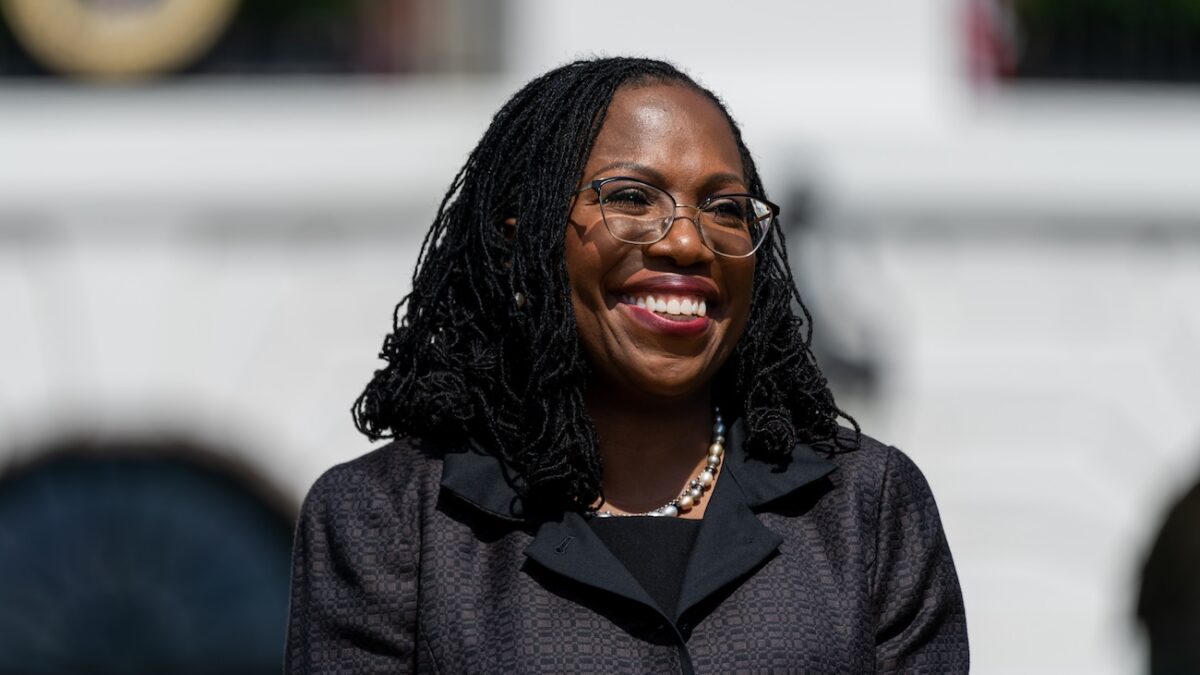Following Monday’s Supreme Court oral argument in the social media censorship case Murthy v. Missouri, outraged free-speech advocates rightfully excoriated Justice Kentanji Brown Jackson for worrying that the First Amendment will “hamstring[] the government in significant ways in the most important time periods.”
Given that “hamstringing” the federal government was precisely the purpose of the Bill of Rights, Justice Jackson’s comment laid bare the fundamental disdain she and other politically liberal justices hold for the classically liberal freedoms our Constitution protects.
But even worse than Jackson’s “hamstring” comment was something she said a half-dozen sentences later.
“So can you help me? Because I’m really — I’m really worried about that because you’ve got the First Amendment operating in an environment of threatening circumstances from the government’s perspective,” Justice Jackson said to Louisiana Solicitor General Benjamin Aguiñaga. Why couldn’t the government communicate with social media companies then? Jackson queried.
Aguiñaga, on behalf of the respondents, the states of Louisiana and Missouri, and several individual plaintiffs who had been censored on social media, countered that the government could communicate with tech companies and share truthful information with them. But in doing so, the government must comply with the First Amendment, which means federal officials cannot ask Big Tech to censor third parties.
Lost in this exchange, however, was the horror of Justice Jackson’s premise — that the government outreaches would depend on federal officials’ “perspective” of “threatening circumstances.”
Five years ago, that proposition might not have seemed so shocking because Americans hadn’t yet lived through the dual outrage of near-universal capitulation to the government’s requests for censorship and the wrongheadedness of the federal government’s “perspective” of “threatening circumstances.” Absent that lived experience, it might have been possible to imagine the government would only solicit Big Tech’s cooperation when truly faced with “threatening circumstances,” or that the social media companies would refuse to remove third parties’ posts, absent a sincere danger.
However, the 20,000-plus-page record in the Murthy v. Missouri case revealed that the government’s “perspective” of “threatening circumstances” can be both dangerously wrong and politically motivated.
For instance, the federal government viewed anything prompting “vaccine hesitancy” as threatening public health. It also maintained that masking and school closures were necessary to protect Americans against Covid. These “perspectives” of “threatening circumstances” flowing from the pandemic led the government to demand that social media companies block users and posts discussing adverse effects of Covid shots or arguing against masking and school closures.
But the government was wrong about all of it, and those censored were right. Had the government not successfully silenced such speech, Americans would have been better armed with facts to make important health and public policy decisions.
Unlike the censorship of Covid-related information, the blocking of the New York Post and articles and posts about the Hunter Biden laptop story flowed not from the government’s supposed perception of “threatening circumstances” — although some federal officials likely also saw Trump’s reelection as threatening — but from political motives.
Once again, the banned speech was true, and Americans were prevented from learning vital information before the election due to the government’s efforts to persuade Big Tech to block supposed “hack or leak” material. (Turns out, the Hunter Biden laptop was no such material.)
It’s shocking that Justice Jackson could posit the government’s “perspective” of “threatening circumstances” should matter, given that the facts underlying Murthy v. Missouri perfectly illustrate the dangers of censorship.
Sadly, she was not alone in suggesting the government could ask, encourage, and even persuade social media companies to silence third parties’ legal speech, so long as there was no “coercion.” The word “coercion” appears nowhere in the First Amendment, however, with the framers instead prohibiting the “abridgment” of free speech.
The Louisianna solicitor general reminded the Supreme Court of that reality several times during his Monday argument, which led to another horrifying exchange with Justice Jackson: After noting that the “top-line question” is whether “the government set out to abridge the freedom of speech,” Justice Jackson countered, “But that’s not the test for First Amendment violations.”
“This flows from the plain text of the First Amendment,” Aguiñaga stressed.
“But we have a — we have a test,” Justice Jackson replied.
Therein we saw the fundamental problem with Monday’s argument, as Jackson and several of her colleagues became too buried in First Amendment jurisprudence to bother returning to first principles and the actual text of the amendment. The abridgment language is controlling and, if applied, provides the plaintiffs with an easy win.
Whether a majority of the justices will apply that textually based standard, as opposed to one of the several judge-made tests, however, remains to be seen.









